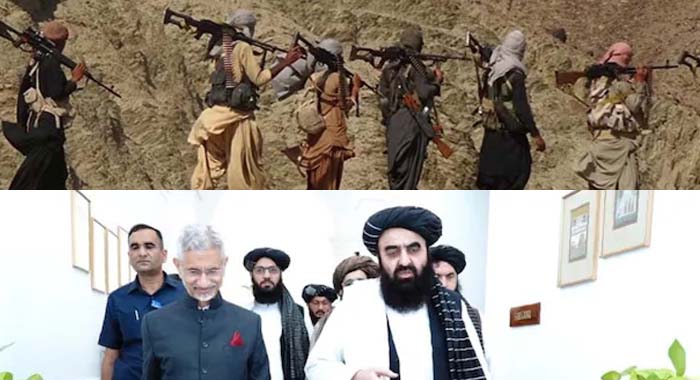The Pakistan Army has once again foiled an unprovoked cross-border attack launched by Taliban fighters and India-backed terrorist networks along the Pakistan-Afghanistan frontier. In the ensuing exchange, more than 200 militants, including Taliban and Khawarij fighters, were neutralized, while 23 valiant Pakistani soldiers embraced martyrdom defending the homeland.
According to the Inter-Services Public Relations (ISPR), India remains the chief sponsor of terrorism in the region, and Pakistan will not tolerate the use of Afghan soil for cross-border attacks. The state and the people of Pakistan are united in their resolve to eradicate terrorism emanating from Afghanistan and will not rest until peace is fully restored.
The Taliban regime in Kabul has received a fitting response for its recent act of aggression. It now knows that hostility toward Pakistan will carry grave consequences. By allowing its territory and resources to be used against a neighboring Muslim country, the Taliban government has not only betrayed its proclaimed principles but also exposed its alliance with India an alliance built on enmity toward Pakistan rather than mutual regional benefit.
Sponsoring terrorism is not a trivial crime; it is an assault on humanity. It breeds hunger, poverty, and fear conditions that devastate societies for generations. When a regime provides financial and logistical support to terrorist groups and turns its land into a base for militancy, it destabilizes not just one nation but the entire region.
The timing of this aggression is telling. Afghanistan launched its provocation while its Foreign Minister, Amir Khan Muttaqi, was on an official visit to India. The joint communiqué issued at the conclusion of that visit openly described Indian-occupied Jammu and Kashmir as part of India an outrageous and hostile declaration that defies UN resolutions and amounts to a betrayal of the Kashmiri people’s right to self-determination. Pakistan’s Foreign Office promptly summoned the Afghan envoy to lodge a strong protest and categorically rejected the statement.
With that, the Taliban regime’s mask has slipped. By aligning with New Delhi and reopening its doors to Indian influence, it has proven that it serves India’s interests rather than those of the Afghan people. Kabul’s actions reveal a broader design: to weaken Pakistan, encircle China, and expand Indian dominance in the region. These moves constitute not only acts of aggression but clear violations of international law.
Equally alarming is the recent announcement that India plans to reopen its embassy in Kabul, coinciding with Muttaqi’s visit. This development evokes troubling memories of the pre-2021 period, when Indian diplomatic missions and an unusually large number of consulates across Afghanistan served as hubs for anti-Pakistan intelligence and militant activity. It appears that this old playbook is being reactivated.
Relations between Islamabad and Kabul have been tense for months, primarily due to the rising wave of terrorism in Pakistan. The presence of TTP leaders and fighters on Afghan soil, along with their training camps and sanctuaries, has been a persistent concern. Pakistan has repeatedly protested, but the Taliban regime has chosen silence and inaction.
For over four decades, Pakistan has hosted millions of Afghan refugees providing shelter, food, and opportunities. Yet many among them, instead of showing gratitude, have facilitated terrorist activities, obtained fake identity documents, infiltrated Pakistan’s systems, and even tarnished its image abroad. Some became hired assassins for local militant networks. Allowing their unchecked presence is no longer in Pakistan’s national interest.
Afghanistan, which opposed Pakistan’s membership in the United Nations at the time of its independence, has historically maintained a hostile posture. Yet Pakistan has consistently extended a helping hand whenever Afghanistan faced crises. Unfortunately, that goodwill has been exploited repeatedly.
India, on the other hand, has long claimed to be a victim of terrorism while being deeply complicit in sponsoring it. Numerous reports have documented how Indian intelligence agencies have financed and armed militant groups, facilitated cross-border attacks, and fueled unrest across South Asia. The result is greater regional instability, heavier sacrifices by security forces, and perpetual fear among civilians.
Every sovereign state has the right to defend its territory. When a nation’s soil becomes a launching pad for terrorism, the international community cannot remain indifferent. The fight against terrorism is not a one-time effort; it requires sustained resolve, coordination, and moral clarity.
A recent American publication noted that Pakistan is facing its most severe insurgency in a decade. Since the Taliban’s takeover of Kabul in 2021, the Tehreek-e-Taliban Pakistan (TTP) has re-emerged as a formidable threat, making Pakistan the second most affected country by terrorism according to the Global Terrorism Index. Yet Pakistan’s armed forces continue to display remarkable courage and professionalism in confronting this menace.
Peace, however, cannot be built on rhetoric or hollow pledges. It demands sincerity of purpose and consistency in action. When a government engages in covert aggression or supports terrorist elements, it violates not only political norms but also the fundamental principles of human coexistence.
The question, then, is what Pakistan’s strategy should be. Strengthening border security, enhancing intelligence cooperation, and ensuring that no territory serves as a haven for militants must be the first steps. Simultaneously, diplomatic engagement should intensify presenting evidence on global forums, building consensus with allies, and pursuing accountability through international law.
At this critical juncture, the role of the international community is vital. The world must recognize that terrorism, in any form or through any facilitation, threatens global stability. The only path forward lies in patience, wisdom, and adherence to legal principles so that future generations can live in a region defined not by fear and betrayal, but by peace, dignity, and mutual respect.





